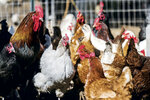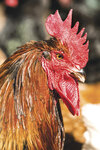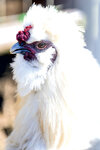


With things like supply chain issues, avian bird flu and inflation driving egg prices up, some Key Peninsula residents are fighting costs by going straight to the source.
The idea of pet poultry and daily farm-fresh eggs right from the backyard is enticing many to get their own birds.
But before going out and buying a coop and a flock of your own, farmers want to share some advice, and some ugly truths, about getting started.
Who Can Sell Eggs?
Pretty much anyone.
There are only a few rules from the Washington State Department of Agriculture to sell eggs from your own property. You must use clean containers and you can reuse them as long as they are clean. Eggs should be stored at 45 degrees or less. If you decide to sell eggs away from your property, there are different rules and regulations to follow.
It’s a Gateway Farm Animal.
Chickens are an easy animal to keep with minimal care. According to Key Center chicken farmer Becky Vanausdal, chickens are gateway animals for anyone wanting to get into farming.
“This year I’m seeing a surge in first-time chicken owners,” Vanausdal said. “It’s similar to the toilet paper (hoarders) during the pandemic. People are looking for food security. It’s not just the egg prices, it’s the price of food in general.”
On the other end of the spectrum, “It’s a fun and mindless hobby,” said Jamie Gates, who raises free-range chickens on her Purdy property.
You Won’t Get Rich.
It’s a hobby that generally supports itself. If you plan to sell eggs (many local backyard farmers on the KP sell theirs for about $5 a dozen), don’t plan on getting rich. If you’re lucky you’ll make enough money to offset chicken feed costs, which have doubled over the last few years. If you’re really lucky, you’ll have some extra money left over to buy bacon to go along with your morning breakfast.
Chuck Lentz, who has nine chickens on his 9-acre property in Lakebay, said it costs him about $20 a week to feed his flock. Kasandra Schauer, owner of Key Peninsula Homestead Farm, said they only feed their flock organic food, which increases the cost significantly. And even if you’re keeping the eggs, free eggs aren’t necessarily “free.”
You May Not Know What You’re Getting.
If you’re looking for egg layers, you need hens. You can have roosters in most places around Key Peninsula, something that’s frowned upon in many Gig Harbor neighborhoods, but most farmers only need one or two. Keep in mind when you buy a chick it’s hard to know if you’re getting a rooster or a hen.
Gates said the problem with hatchery-born chicks is they stop producing eggs faster, so she breeds a barnyard variety. “We want longevity,” Gates said. “We have birds that are 8 years old and still laying an egg a day. We want those eggs to pass on the genetics.”
For backyard farmers who get in over their heads, Bill Neilson, owner of Happy Rooster Farm in Lakebay, may be able to help. He’s been known to take roosters and hens off peoples’ hands to re-home them. All he expects in return is a bag of chicken feed and bedding for the birds.
Keep It Clean.
Chickens are really messy. They can quickly turn your yard into a mud pit during the winter, and when it’s dry they kick up dust.
“It’s super important to stay on top of cleaning,” Gates said. Neilson and Gates both said they change food and water daily. Gates also suggests putting supplements in the water, like unpasteurized apple cider vinegar once a week for probiotics. She also adds some red pepper flakes to their food because it’s a natural dewormer.
Vanausdal said if you have multiple coops to keep different shoes and different tools for each one to prevent transmitting diseases. No matter what you do, most farmers agree that with chickens comes chicken feed and with chicken feed come mice. It’s hard to keep them away regardless of what you do.
As far as eggs go, the WSDA says to dry-clean with sandpaper or use clean water and wipe them dry with a single-use paper towel. Don’t submerge eggs in water to clean them.
Neilson sells eggs from his farm, but he’s also a licensed wholesaler who distributes eggs at PJ’s Market and Collelos in Port Orchard, and a small store in Bremerton. He cleans, inspects and “candles” (shining a bright light to get a view inside the egg) every egg he sells, no matter who is buying them, to make sure he’s providing the best quality product.
Pay Attention to Details.
Vanausdal said not all breeds of chicken lay eggs every day, and most mature hens don’t lay eggs during the winter, unless you add warming lights to the hen house.
She also said it’s important to look closely at the feed you’re giving the birds. “Chickens need 14 minerals to produce an egg and they usually hold back laying an egg until every building block is there.”
Don’t Plan On Traveling Anytime Soon.
“You have to treat these animals like your children. That means giving them your attention seven days a week, 365 days a year. There’s no day off,” Neilson said. “I haven’t taken a vacation in 10 years.”
Schauer also works daily collecting eggs up to three times a day, but it only takes about five minutes each time.
Predators Are All Around.
Once you introduce chickens to your yard, winged-predators like hawks and bald eagles will be eyeballing your flock from nearby trees. Four-legged predators like raccoons and coyotes will be walking your fence line before you know it. And don’t forget about the two-legged predators.
“I’ve had to start bolt-locking my coops at night to keep people from stealing my chickens,” Vanausdal said.
It Can Be Addicting.
“I call it ‘chicken meth,’ ” Gates said. “You start with good intentions of having five or six chickens. Then it becomes 15. Then it becomes 30.”
You Have Access to Specialty Breeds Right Here on the KP.
People like Vanausdal and Gates have an appreciation for these birds. Vanausdal used to run Raregg Ranch on her 50-acre property off 118th Avenue NW. It was a nonprofit poultry preservation center dedicated to saving specific species. She has since downsized to a few acres in Key Center where she specializes in French Copper Marans, known for their dark chocolate-colored eggs, and the super rare Olandsk Dwarfs. All her hatching eggs are sold out until June.
Gates also sells specialty breed eggs for $45 to $60 per egg.
You Can Use Eggs for Other Things Besides Eating and Breeding.
Gates said she has seven large dogs, and she gives each dog an egg a day to help keep their skin moisturized and their coats shiny.
Schauer said she uses eggshells as a natural pesticide for the organic produce her farm grows and sells.
Every big yard farmer and backyard farmer encourages people to get involved with agriculture. “Farming is a dying culture,” Neilson said. “Kids have the opportunity to learn about these animals up close. It teaches them how to care for something, it teaches them responsibility.”
Learn more about selling eggs from your property at www.agr.wa.gov.
UNDERWRITTEN BY THE FUND FOR NONPROFIT NEWS (NEWSMATCH) AT THE MIAMI FOUNDATION, THE ANGEL GUILD, ADVERTISERS, DONORS AND PEOPLE WHO SUPPORT INDEPENDENT, NONPROFIT LOCAL NEWS